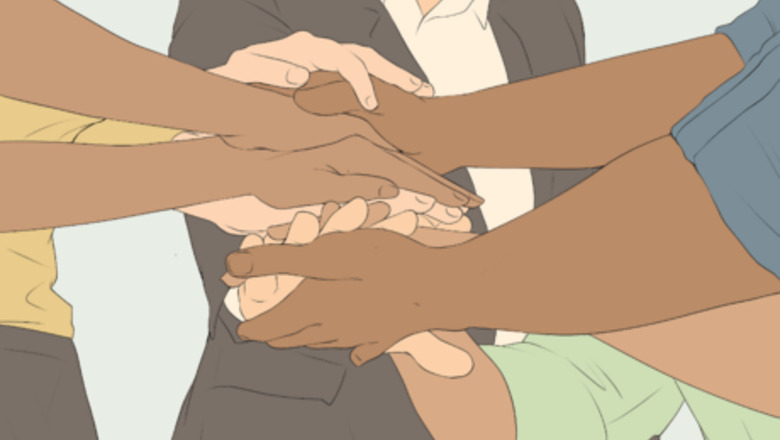
views
- Research the position by reviewing the job posting, and learn more about the company by browsing its website or reading news articles about it.
- Establish a rapport with the interviewer with some small talk before the interview begins. Then, tell them a story that traces your professional life to this point.
- Ask specific, thoughtful questions about the position and its responsibilities, and frame your weaknesses as opportunities to grow.
Do your research on the company.
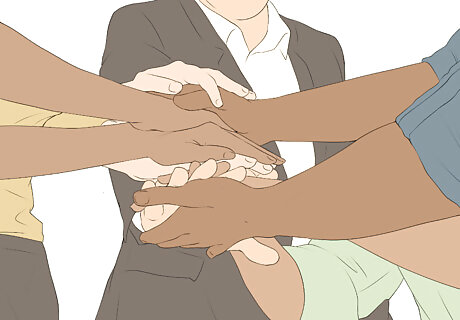
Familiarize yourself with the job’s culture and mission statement. Research the job’s responsibilities, the company’s history, and what they’re looking for in an employee, which is information often supplied on the job posting or the company’s website. Ideally, you’ve done your homework before you even applied to prepare for the interview, but it’s never too late to review the job description before you head to the office. If the company does work for other companies, try to find a list of their clients to name-drop in the interview, which tells the interviewer that you’ve really done your research. Also do a quick Google search on your interviewer, if their name has been provided, to get to know their professional background. For example, you might say, “I really admire your marketing work for Maybelline, which I read about in Adweek.”
Dress like you just got a promotion.
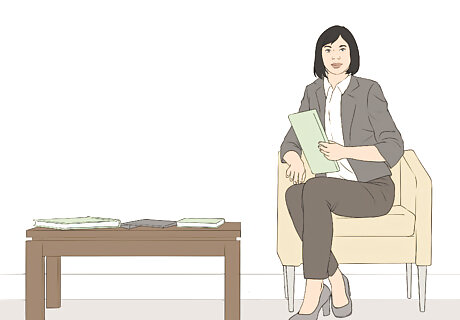
Wear an outfit that’s one level above the position’s dress code. Presentation is everything, and that extends to your wardrobe. Instead of just wearing what you’d probably wear for a normal day on the job, dress for your interview like you’re gunning for the position directly above the one you’re applying for. Not only does this display a proper level of professionalism, but it shows them that you’re serious about this interview, and seriously want this job. When in doubt, ask HR what the office dress code is. For example, if the job calls for a simple button-down or blouse and slacks or a skirt, break out the suit jacket or blazer. Don’t be afraid to express yourself with a bold (but tasteful) color choice. A sensible, forest-green button-down is more memorable than yet another white shirt or black tie. Add some accessories. Jewelry, watches, and smart heels or dress shoes are a great way to show your personality within a dress code.
Arrive early to impress them immediately.

Show them you’re punctual and reliable even before the interview. Things happen, sure, but arriving late to an interview is never a good look. Arriving 5-10 minutes early, though, shows the interviewer that you’re mindful of your time and theirs. When in doubt, leave 30 minutes before you think you need to, which gives you plenty of wiggle room. You can always sit in your car or in a nearby cafe if you arrive with oodles of time to spare. Also, there is such a thing as arriving too early. If you walk in the door 30 minutes before your interview, you may be making yourself more of an imposition than an asset.
Establish a connection with some casual conversation.

Use small talk to build a rapport. Making small talk to establish a personal connection with your interviewer before the interview officially begins helps make you more memorable and more at ease. Ask your interviewer how their weekend went, or if they have any weekend plans, as you walk into the interview. Then, provide some relevant personal details of your own. This can help get a good rapport going, and if the interviewer is enjoying themself with you, you’re sure to stand out. For example, if they say, “I took a hike in the mountains,” you might reply, “Oh? Where to? Have you tried this trail? It’s my favorite.” You might also use small talk geared toward the job itself, like, “What does your work day look like after this interview?” or, “I love the decor in your office, did you choose it yourself?”
Tell the interviewer a story about yourself.
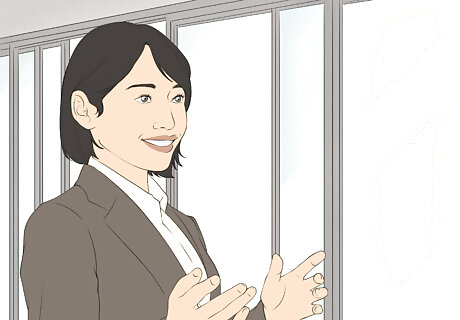
Communicate your professional journey that led to this interview. Many interviewers ask you to introduce yourself. Rather than giving them just the basics like your hometown and favorite color, focus on the professional journey that led you there. Tell them about your studies, how and why you picked your career field, and any relevant job experience or notable achievements related to the job. Save personal details for small talk, or for after you’ve established your credentials. It’s also a good idea to tell them where you want your career to take you and how this job can help you get there. Even better if “there” is a position within the company.
Give them a plan for when you’re hired.

Tell the interviewer what you hope to achieve in your first months. Your ideal job is one that you’re passionate about, and which embodies a product or a service you believe in. When that’s the case, and after you’ve researched the company, you’ll probably have some ideas for what you can bring to the job itself, and even tasks or goals you want to accomplish from the moment you’re on the job. Sharing these with an interviewer tells them that you’re not only invested, but that they could put you on the job right now and get immediate results. Sharing what you’d like to have accomplished in 30, 60, and 90 days, respectively, shows the interviewer that you’ve put a lot of thought into this position. For example, you might say, “In 30 days, I want to be oriented within the company and know my team and our mission. In 60 days, I want to be fully immersed in that mission and working toward achieving it. In 90 days, I want to be making plans for new ways we can achieve that mission in the future.
Ask thoughtful questions about the position.
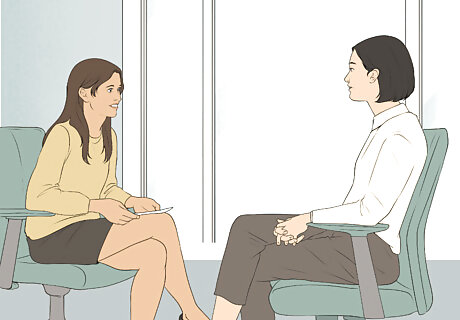
Show your expertise by asking more specific questions. Asking the interviewer questions turns the table and makes it feel more like a conversation than a one-sided interrogation, which is sure to impress the interviewer. But the questions themselves matter, too. The more specific your question, the more the interviewer knows that you’ve come prepared, interested, and eager. For example, rather than simply asking, “What’s the pay for this position?” ask a better question like, “I know the starting salary is this much; are there opportunities for raises or advancement? And how can I satisfy the criteria for them?”
Use confident body language.

Command attention with positive, comfortable body language. Having good posture and practicing open body language shows the interviewer your confidence and professionalism, and also helps to calm yourself. Make an effort to slow your breathing and maintain eye contact with your interviewer. Sit up straight, with your shoulders relaxed, rather than stiff or slumped. And more than anything, remember to smile! Also, mirror your interviewer’s own body language to establish a rapport. If they’re big on hand gestures, use some hand gestures yourself. If they tilt their head while listening, pepper some head-tilting into your own body language, too. Just be sure not to overdo the mirroring, which may make them feel unsettled. A light touch is key.
Fill them in on your track record.

Emphasize any accomplishments in your past positions. You might have mentioned your qualifications earlier in the interview, but it’s always a good idea to dive deeper into them when the opportunity presents itself. Things like relevant job experiences, even internships or coursework in school, all count toward making a good impression. If you can, explain the particular challenges of those experiences and how you handled and overcame them. Also, get specific with projects you completed at other jobs, and how you completed or collaborated on those projects, as well as how that translates to this job. For example, you might mention how you helped a previous team stay on a deadline by prioritizing certain tasks, or by finding solutions to tricky problems.
Turn your weaknesses into strengths.

Frame your shortcomings as a passion for growth. Just like on your cover letter, keep the focus on your strengths rather than any areas where you might fall short. Answer tough interview questions like “Describe your weaknesses” by swapping “weakness” for language like “challenges.” Describe how you worked to overcome them, rather than flat-out describing your shortcomings. Also, emphasize “challenges” that are easily overcome through training, rather than the more permanent weaknesses. For example, instead of, “I have poor time management,” say, “Time management was an issue in a past job, but I’m proud to say I worked hard with my supervisor to develop strategies to stay on-task and deliver on a deadline.” Also, opt for “challenges” that have little to do with the job itself. If it’s a creative job, avoid an answer like “I get art block frequently,” and go for something like, “I’m always working to get better at handling data and numbers.”
Show them the real you.

Be authentic to let them know you’re easy to work with. Even in a job interview when you’re trying to present the best, most polished version of yourself, it’s important to still be just that—yourself! The interviewer does want to know who you are as an individual so they can gauge how you might fit into the workplace culture. Show them your best side, but also be authentic and don’t try to be someone you’re not. Calm your nerves to help you relax and stay confident. Try a breathing exercise before you enter the interview: breathe in for 5 seconds, then out for 5 seconds.
Follow up with an email.

Remind them of your credentials and enthusiasm after the interview. You’ve still got some persuasive power even after you walk out the door. Ask the interviewer for their business email address. Then, within 24 hours of the interview, send them a follow-up email thanking them for their time and telling them how much more enthusiastic you are after having the chance to interview. Reference something you learned in the interview to show them you were paying attention. For example, you might write, “Thank you so much for your time today. I enjoyed getting to know more about the company, and now I’m even more excited at the prospect of joining the team, and confident my skills will be a great fit.”















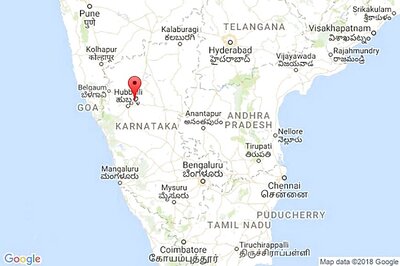
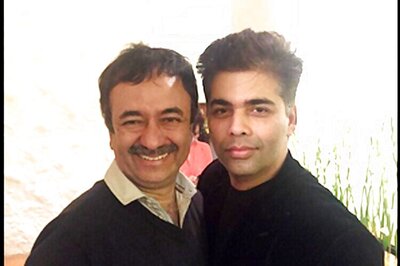

Comments
0 comment